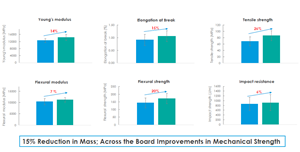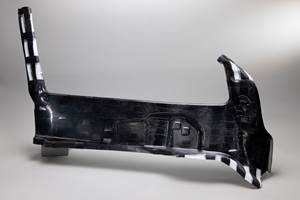Thermoset prepregs meet lightning strike protection specifications
CAMX 2024: A.P.C.M. highlights how its range of epoxy prepreg offerings undergo and surpass lighting strike testing.
Share
Adhesive Prepregs for Composite Manufacturers (A.P.C.M., Plainsfield, Conn., U.S.) has been developing thermoset epoxy prepregs for the manufacturers, designers and hobbyists of composite parts since 1992. A.P.C.M. highlights how its standard epoxy prepreg systems and substrates are available for lightning strike testing review. To achieve this, the company develops the panels and sends them for testing by the Elements Testing Group (Pittsfield Mass., U.S.).
A.P.C.M. breaks down this process. To create the test panels, the company lays up 22 plies of material, the top ply being the lightning strike carbon fiber prepreg. Complete panels are 27" × 27" and 0.20-0.22 thousands thick. Debulking, curing and paint parameters are per Boeing specifications.
Panels testing shows two panels — differentiated by the thickness and the weight of the needle punched copper foil used to make the lightning strike prepreg — prior to and after strike tests. Testing is called zone 1 and zone 2, which equates to the power of the electricity used to strike the panel. One panel had a 0.029 Ib/2ft of copper and the other 0.040 Ib/2ft of copper. Each panel experienced surface damage but maintained their structural strength and protected against lightning strikes. which can result in the shorting out any of an aircraft’s electrical components.
At its booth, A.P.C.M. is showing a high-speed video of the test being performed, as well as all of its other standard thermoset epoxy prepreg products, from 180-375°F curing systems, including specialty woven and standard woven substrates from glass to carbon fiber to Kevlar. This includes hybrid carbon fiber/colored glass, carbon fiber/Kevlar, spread tow carbon, flax and hemp. Cured and uncured samples, as well as substrates are available for attendees to view.
Related Content
-
Graphene-enhanced SMC boosts molded component properties
CAMX 2023: Commercially sold GrapheneBlack SMC from NanoXplore increases part strength, stiffness and provides other benefits for transportation, renewable energy, energy storage and industrial markets.
-
VIDEO: Recycling and machining carbon fiber scraps
Elevated Materials has partnered with Toray Composite Materials America, Inc. to collect and upcycle reclaimed carbon fiber scraps into large billet laminates, which can then be cut into various parts using CNC mills.
-
CAMX 2024 Show Daily: Wednesday, Sept. 11
The second day of CAMX 2024 has all sorts of things in store for attendees, from Tuesday’s keynote centered around the world of AI, to award and poster session winners and what to look forward to at Good Day, CAMX on Thursday.
Related Content
Graphene-enhanced SMC boosts molded component properties
CAMX 2023: Commercially sold GrapheneBlack SMC from NanoXplore increases part strength, stiffness and provides other benefits for transportation, renewable energy, energy storage and industrial markets.
Read MoreVIDEO: Recycling and machining carbon fiber scraps
Elevated Materials has partnered with Toray Composite Materials America, Inc. to collect and upcycle reclaimed carbon fiber scraps into large billet laminates, which can then be cut into various parts using CNC mills.
Read MoreCAMX 2024 Show Daily: Wednesday, Sept. 11
The second day of CAMX 2024 has all sorts of things in store for attendees, from Tuesday’s keynote centered around the world of AI, to award and poster session winners and what to look forward to at Good Day, CAMX on Thursday.
Read MoreHighly tunable, woven lattice reinforcements target automotive structures
CAMX 2023: Startup Weav3D will be demonstrating its two collaborative automotive demonstrator parts and present two conference papers.
Read MoreRead Next
Surfacing Film Incorporates LSP Into One Ready-to-Use Film
Lightning can create serious risks to the structural integrity of the aircraft and to the safety of its passengers. That’s where lightning strike protection comes in.
Read MoreDeveloping bonded composite repair for ships, offshore units
Bureau Veritas and industry partners issue guidelines and pave the way for certification via StrengthBond Offshore project.
Read MoreAll-recycled, needle-punched nonwoven CFRP slashes carbon footprint of Formula 2 seat
Dallara and Tenowo collaborate to produce a race-ready Formula 2 seat using recycled carbon fiber, reducing CO2 emissions by 97.5% compared to virgin materials.
Read More









